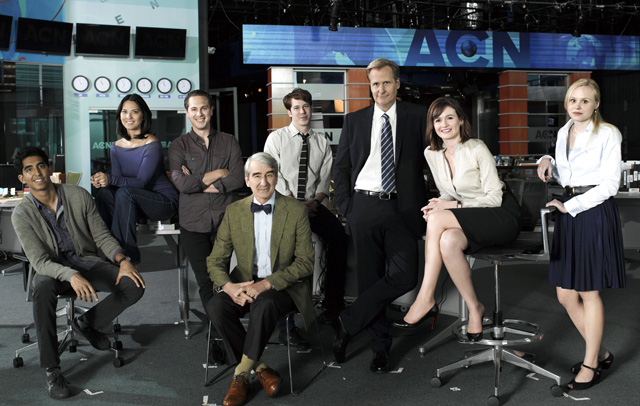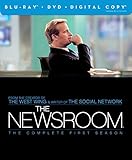The paradox that is Aaron Sorkin’s The Newsroom

Aaron Sorkin’s ‘The Newsroom’ is anything but subtle, but can he fix the show in time to make the final season as great as his past shows?
Written by Guest Clacker Brandon Coulson
The Newsroom’s second episode of its third and final season is entitled “Run,” though a more appropriate title might be something along the lines of “the ethical ethics of morality or how we’re so much better than you.” The show continues to be a paradox for me. I find myself loving and hating it from moment to moment, and this episode is a perfect example why. All of the tropes I love from Aaron Sorkin’s past works are here but they feel forced. It’s like he’s doing a bad cover of his own greatest hits, and while I still love the song, the performance leaves much to be desired.
The episode collects several separate plotlines, all focusing on questions of ethics versus legality versus what the right thing to do is; how the news world and the internet/social media age is so focused on what is legal that we’ve forgotten how to distinguish right from wrong. A producer overhears an off-the-record comment in a public space, a colleague gets insider trading from casual conversation without realizing it, a rich heir wants to sell their legacy for cash, and a source has illegally obtained government documents that reveal illegal acts that caused the deaths of innocents.
Sounds like a lot, right? Reading all that you’d probably think this is what happens over an entire season, and for all we know that could end up being true, but at the moment we are only two episodes into this season and only one of those plotlines was introduced in the first episode. This has been a repeating theme for this show: over-cram as much as you possibly can into every episode. There are more life and death decisions, and what they want us to see as edge of your seat drama, in any episode of The Newsroom than there ever was in The West Wing. I find myself rolling my eyes time and time again as a perfect storm of situations hit Will McAvoy and his crew, all ironically having some common theme. No, subtlety is not in Sorkin’s wheelhouse with this show, where The West Wing, Sports Night, and Studio 60 on the Sunset Strip found drama in the mundane, the day-to-day minutiae of their respective fields. The Newsroom feels like every episode needs to be about giant issues and that everyone involved has to be a pillar of morality. Don’t get me wrong: those other shows had their heavy-handed “big” episodes too, but they also knew how to have fun in their side stories, or how to have an episode now and then that was just about how people’s lives are in these fields that most of the public never get to see. That’s the interesting thing about those older shows: human interaction of great people being people, not great people being better than you or me.
Another area they can’t seem to get just right is a relatable — or more accurately — a likable love story. The first season focused on the will-they-won’t-they Jim and Maggie, or as I call them: not Jim and Pam. I have yet to find one person who watches the show and enjoyed this plotline. Season two threw several couplings together to see what would work: Will McAvoy and his producer/ex Mackenzie McHale (Really? Is she from Mary Poppins with that name?), Sloan and Don (she’s smart and he’s dumb; very original), as well as Jim and a field reporter he comes across who really doesn’t like him. (What? You mean they fall for each other? What a surprise!) These stories all continue into season three and none of them really ever gel. I know they want a repeat of the Josh/Donna relationship from The West Wing, but that was built slowly, methodically, over seven years and they had chemistry. None of the couplings here feels anything but forced.
That all being said, there’s still a lot that brings me back three seasons in a row. The writing, while at times a bit cliché and preachy, still has some fantastic moments. Jeff Daniels and Sam Waterston, as Jim McAvoy and Charlie Skinner respectively, are fantastic anytime they are on screen. If I could, I’d cut most of the cast and center the whole show around those two. Also, even though I cited its “better-than-thou” air as a detriment, in small doses it is nice to see a show eloquently encouraging us to be better than average; to be more than just good enough. If the show can cut back on its message of the week, try to have some fun, and give up on the romantic angles, it could go out on a high note. That being said, there are no signs that the rest of this season will be anything different from the rest of the show’s run — a well-intentioned, extremely flawed, but still fun to watch distraction.
 CliqueClack
CliqueClack




I just seen the view and heard you need an idea for a show I have one but don’t know how to get it started
I need to write my own hatewatch think piece at some point.